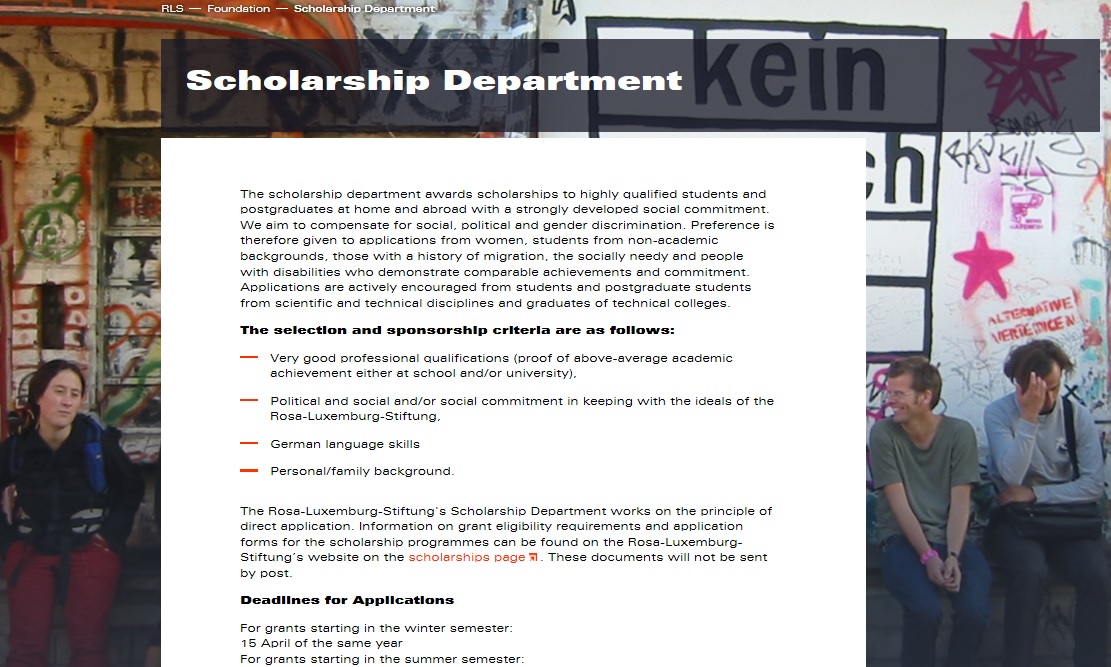Announcement – two PhD scholarships supported by the Rosa-Luxemburg-Stiftung
on the subject of Global Social Rights
The Rosa-Luxemburg-Stiftung will award two PhD scholarships on the subject of Global Social Rights (GSR) starting 1 April 2018 for a duration of two years (with scope for two 6-month extensions) as part of the cooperative doctoral research group on Social Human Rights at the Universities of Kassel and Fulda.
Developing a discourse on Global Social Rights and implementing social and democratic human rights around the world is a priority of the work carried out by the Centre for International Dialogue and Cooperation, the international division of the Rosa-Luxemburg-Stiftung.
A key starting position for GSR is that social and political human rights are inseparable and interdependent. The complete implementation of social, economic and cultural human rights – such as the right to enough food, suitable housing, access to education, a high degree of physical and mental health, the right to work, and fair and favourable working conditions for all people – is also viewed as an essential prerequisite for the complete implementation of civic and political human rights, such as the right to express your opinion freely and freedom of association, and essentially all civil liberties. The assumption behind this postulation of the inseparability and interdependency of human rights is very simple: only those who have a socially secure existence in the comprehensive sense can fully embrace their right to participate in the democratic process and utilise their civic and political rights. And only those who can live free of the fear of political persecution and repression and assert their democratic rights can fully access and actualise their social rights.
Indeed, during the power bloc confrontation of the Cold War, political and social rights were often set against each other. The discourse on GSR attempts to do away with this separation. This inseparability of social and political human rights differentiates the discourse on GSR from a reductionist view of human rights, which only orients itself towards an isolated view of civic and political rights that ignores societal conditions. By contrast, GSR is bound up with newer discussions on human rights and the further development of social human rights, which are being held at the United Nations level and take social rights into much greater consideration (for instance, the Vienna Declaration from the 1993 World Conference on Human Rights).
The concept of GSR goes far beyond this, however. It is political and controversial because it clearly reveals power and dominance relationships which counter the actualisation of global social rights. GSR are based on a concept of human rights which not only criticises the violation of human rights but makes evident and seeks
to overcome the contradictions of the dominant production and dominance relationships. The starting point is to treat people as acting political subjects and individual and collective legal entities. GSR demand the same rights for all people regardless of ethnicity, sex, religion or nationality. A basic ecologically sustainable and socially just transformation of the means of production and the ownership structures and a democratisation of ‘global governance’, are viewed as prerequisites for the implementation of GSR. Consequently, GSR consolidate and update the universal concept of emancipation of democratic socialism.
Specifically, there is a need for research in the following areas:
Political theory on developing a comprehensive understanding of social and political human rights within the context of democratic-socialist societal discussions.
Examining processes for establishing and further developing social rights in national legislation, international contracts and conventions (for the United Nations, International Organization of Labour, European Union, Council of Europe etc.) and mechanisms for implementation at the national and supranational level.
Examining processes involved in developing, articulating and implementing social rights through social movements and the strategic use of the concept of social rights in strengthening transnational processes for organising social movements (case studies on trade unions, farmers’ organisations, women’s organisations etc.)
Examining approaches on the basis of global ecological sustainability and GSR for overcoming imperialistic ways of life and the development of ways of life based on solidarity.
Within this thematic framework, scholarship holders are ensured high-quality doctoral studies. What is of crucial importance is the interdisciplinary way in which the doctoral research group has been organised to include legal studies, political science, philosophy, sociology and economics.
Requirements:
– an MA, Diplom or master’s degree (Magisterabschluss) marked with at least ‘good’; for state examinations in law marked with at least ‘satisfactory’
– current and significant engagement in civic and social projects in the spirit of the Rosa-Luxemburg-Stiftung
– a developed and informative PhD proposal on one of the subjects mentioned above
– the willingness to participate actively and regularly in the events organised as part of the doctoral research group in Kassel and Fulda
– the willingness to actively and continually participate in the activities at the Rosa-Luxemburg-Stiftung Centre for International Dialogue and Cooperation in Berlin or at sites associated with RLS international offices on the subject of Global Social Rights during the course of your PhD
– the thesis may be written in German or English
PhD students will be expertly mentored by the professors involved in the doctoral research group in Kassel and Fulda; in addition, as scholarship holders, they will be
connected to the Rosa-Luxemburg-Stiftung scholarship department and can take part in its non-material support programme.
Integration and scholarship:
Scholarship holders are associated with the doctoral research group
The scholarship is made up of a monthly basic grant of €,350.00 and €00.00 as a lump sum for research expenses; in addition, extra allowances can be paid for children and their care. Allowances and lump travel sums are paid for study trips abroad.
Deadline and documents required in support of your application:
Please make sure your application contains all the documents required
– CV in tabular format
– Degree certificate
– Proof of involvement in social projects
– Proposal (brief proposal, table of contents, detailed proposal, project plan and time schedule, and publications list)
– Copy of your passport and residence permit if required
– Proof of knowledge of German (at least B2 level)
Via our online portal: https://www.rosalux.de/stiftung/studienwerk/
Deadline for applications is 15 October 2017.
You can find further information about the scholarship on our website.
Further information about the doctoral research group on Social Human Rights
https://www.uni-kassel.de/projekte/kolleg-soziale-menschenrechte/startseite.html








